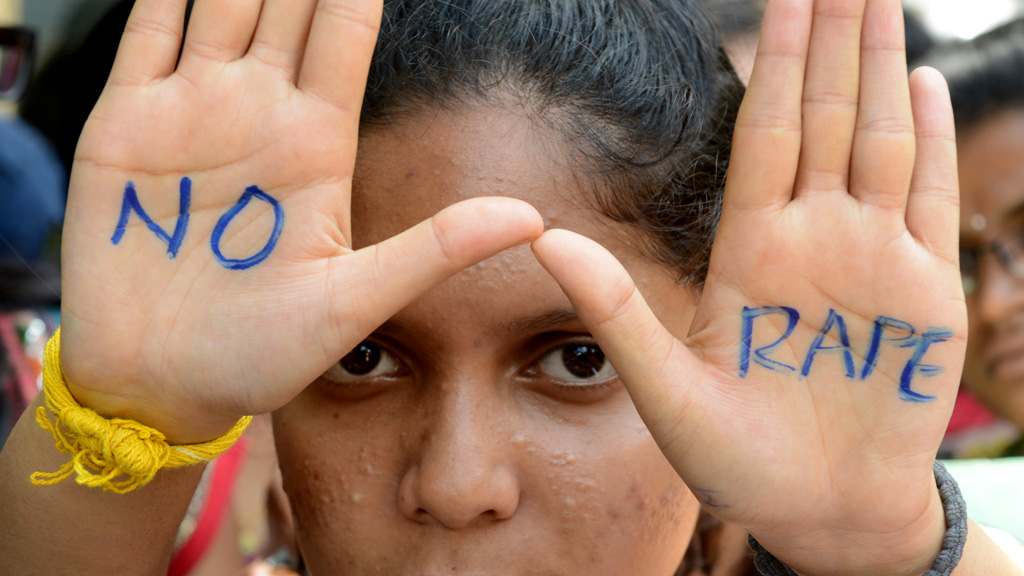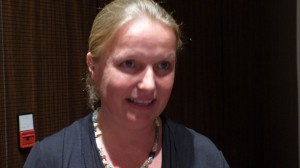Atrocities on women in India: ‘It’s not just a gender problem.’

Indian students of Saint Joseph Degree college participate in an anti-rape protest in Hyderabad on September 13, 2013. (© Getty Images/N. Seelam)
In the backdrop of the numerous reported cases of rapes, gang rapes and widely visible discrimination against women in India, the German author, artist and social worker Dr. Katharina Poggendorf-Kakar spoke about the India-specific form of such violent acts. Dr. Poggendorf has lived in India since 2003 and travelled extensively through India to understand the basis of such atrocities on women.
Ritika Rai from DW asked Dr. Katharina Poggendorf-Kakar, when does violence become India specific, since violence against women is not something that happens only in India.
Dr. Katharina Poggendorf-Kakar: If there is a group rape then the tremendous violence is visible. So, where is it coming from? I am trying to look into cultural context of cast, of hierarchy, of status and so on.
DW: Why do you think Indian women become the target of so many violent atrocities?
“That’s exactly why I wrote the book. To kind of show the different sides, to contextualize and also to show where the violence actually becomes India specific. For example, bride burning and so on…”
DW: Do you think the ancient Indian cultural notions are also to be blamed for it?
“Culture has such an impact on who we are. I think, what would help is elimination of the cast systems and that will take generations. But I think that is one of the core problems of suppressions, not just of women but also men, but especially poor women. So at the moment, it doesn’t matter who you marry and which cast you belong to. I think there will be a huge change for Indian society and especially for women of lower casts and lower classes.”
DW: Do you feel that is not a women’s problem but an extension of some other overarching societal defect? If yes, what is it?
“It’s not just a gender problem. A high cast woman is more powerful than a low cast man. So it’s more complex and my interest is to show that complexity, to also differentiate all these issues. It’s not just men who suppress women; it’s also elder women who suppress women.”
DW: How important it is for women to achieve economic self dependence? What could save them from violence and discrimination?
“Education and thus the possibility to earn (something for her life – ed) are tremendously important factors for women to live a more individualistic life according to their own kind of rules. That’s true worldwide in a way. So, it’s extremely important to involve women not only in economy but also in politics, in power structures where their decision making has an impact on the communities that involve women. So, politics and economics are the core questions of change. But within Indian culture cast is also the major player.”
DW: What was your perception of India before you went there and has it changed since you started living there 12 years ago?
“I think before I came to India, I had a very idealistic idea about India as the spiritual country, as many people have. That of course kind of changed over time and become more grounded. I guess I am a very open person, very curious about human beings and India is just the place where you can be curious and experience so many wonderful things with people. I think, that very much formed my vision and imagination about India. Stories. It’s about stories of people and stories about mythology. I still collect stories.”
German author Dr. Katharina Poggendorf-Kakar’s latest book “Frauen in Indien: Leben zwischen Unterdrückung und Widerstand” (Women in India: life between suppression and resistance) is about the condition of women in India, with a special focus on the violence against women and the root causes of it. The book is slated to be released in October 2015.
Interview: Ritika Rai
Editor: Marjory Linardy
WTO RECOMMENDS
To be or not to be India’s Daughter?
On the occasion of International Women’s Day, NDTV, India’s largest English news channel, was due to broadcast British filmmaker Leslee Udwin’s documentary India’s Daughter. The film is based on the brutal murder and gangrape of a 23-year-old physiotherapy student, Jyoti Singh also known as Nirbhaya which means ‘The Fearless One’. (From March 8, 2015)
The 27th question : what is this ‘rape culture?’
Last week, an interesting post was doing the rounds in social media: 26 questions people from India are sick of answering. In the years I have been living abroad, I have been confronted with these questions over and over again. Do you speak ‘Hindu?’ Which caste do you belong to? But you actually pray to cows right? (From December 13, 2013)
Yet another gang rape in India
Yet another gang rape – this time in a bus in the Indian capital – has revived the debate in India as to whether the country is safe for women. What makes the debate all the more urgent is the fact that this heinous crime is similar in nature to several others in the last few months without any stern punishment of the offenders. (From December 18, 2012)







